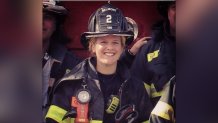The NBC10 Investigators learned the Massachusetts Department of Labor Standards conducted an investigation where they concluded the Town of Belmont created conditions that placed “employees at risk of work-related injury or illness” during the early months of the COVID-19 pandemic, according to the copy of an inspection report we obtained.
In March of 2020, the Belmont Department of Health sent a letter to families and staff announcing they would soon start regularly disinfecting schools to combat the emerging threat of COVID-19.
According to the DLS report, the spraying would also happen in other municipal buildings and vehicles, including the fire and police departments.
Months after the spraying, the DLS report detailed how town employees started reporting respiratory problems and migraines. One first responder we spoke with even experienced a seizure.
"I was sitting at my desk and said, 'Something is not right.' I just don’t feel right," recalled Lizzie Kinch, a former Belmont firefighter.
As a frontline worker, Kinch said the town regularly disinfected anything firefighters came into contact with.
"They started spraying chemicals on the trucks, inside the trucks, on our gear," said Kinch. "Our living quarters got sprayed. Hallways got sprayed. Beds. They’d spray everything."
Local
Kinch thought the spraying was good because it was an effort to protect employees and their families from the virus.
But a couple of months into the pandemic, Kinch said constant headaches turned into horrible migraines that would sideline her for 12 to 24 hours.
Then one day, while in her third trimester of pregnancy with her son, Kinch suffered a seizure while on duty.
"My world got turned upside down that day," she told NBC10 Boston.

Kinch wasn’t the only firefighter to experience health problems during that period.
"I felt very short of breath, just on simple exertion like walking up the stairs or walking down the hallway. I was short of breath, which has never happened to me before," said another former Belmont firefighter, who started experiencing migraines and fatigue after the spraying began.
The firefighter asked us to conceal her identity because she now works for a different fire department, but felt it was important to speak out about what she and other town employees experienced.
"It’s a big problem," she said. "I feel like something needs to be done about it."
A Belmont police officer told us he started getting nosebleeds after his department vehicle was repeatedly sprayed.
In documents provided to the state’s investigation, two Belmont custodial workers that sprayed the chemicals for several months reported trouble breathing, headaches, vision problems and fatigue.
The NBC10 Investigators learned the Department of Labor Standards (DLS) launched an investigation after getting a complaint from the union representing those two custodians. A letter from the union claimed the town had "willful and blatant disregard for the safety and wellbeing of the workers."
In the inspection report, the custodians told inspectors they initially used a Clorox Total 360 electrostatic sprayer system. According to the report, when they ran out of the Clorox product in just two days, the workers claimed supervisors directed them to "tamper with the non-refillable containers" and add a new disinfectant chemical.
Despite expressing their concerns about safety, the workers claimed they were told to "be quiet and not say anything,"according to the letter sent to DLS.
"It sounds like what they were doing is prying off the top and applying their own chemistry," said Dr. Jason Marshall, the lab director for the Toxic Use Reduction Institute at UMass Lowell.
Marshall reviewed the inspection report from DLS and provided his analysis.
"The problem I noticed was that the alternative one they switched to was supposed to be diluted," said Marshall, "If they took it as the concentrate, it was not supposed to be something used in the electrostatic sprayer."
Instead, Marshall said the second disinfectant should be used with a mop and bucket or a hand-sprayer that’s wiped on the surface, not a mist of chemicals that hangs in the air.
"If you read the safety data sheet, it does say right on there that it can cause asthma and respiratory issues. It’s also very highly irritating to the skin and eyes," said Marshall.
According to Belmont's town administrator, Patrice Garvin, the town worked closely with DLS to complete and implement 10 corrective actions earlier this year. The required items all focused on training of safe handling of hazardous chemicals and proper protective equipment.
DLS closed the case after Belmont made the required safety corrections and did not issue any fines, according to an agency spokesperson.
Meanwhile, Garvin told NBC10 Boston the managers who oversaw the spraying left on their own terms to pursue other opportunities and no longer work in Belmont.
Kinch feels like there should have been more transparency with town employees about what happened.
After the seizure, she said doctors diagnosed her with epilepsy and said the health condition was not attributed to her pregnancy.
After finding out about the DLS investigation, Kinch said she asked her neurologist if her seizure could have been a result of the spraying.
"He said, 'Absolutely, but there's nothing you can do about it now. You've been exposed,'" Kinch said.
Because of job complications with the seizure, Kinch told us she resigned from the force last spring.
"I love being a firefighter. It’s literally the greatest job in the world," said Kinch, growing emotional. "It’s my dream job. How do you walk away from that?"



